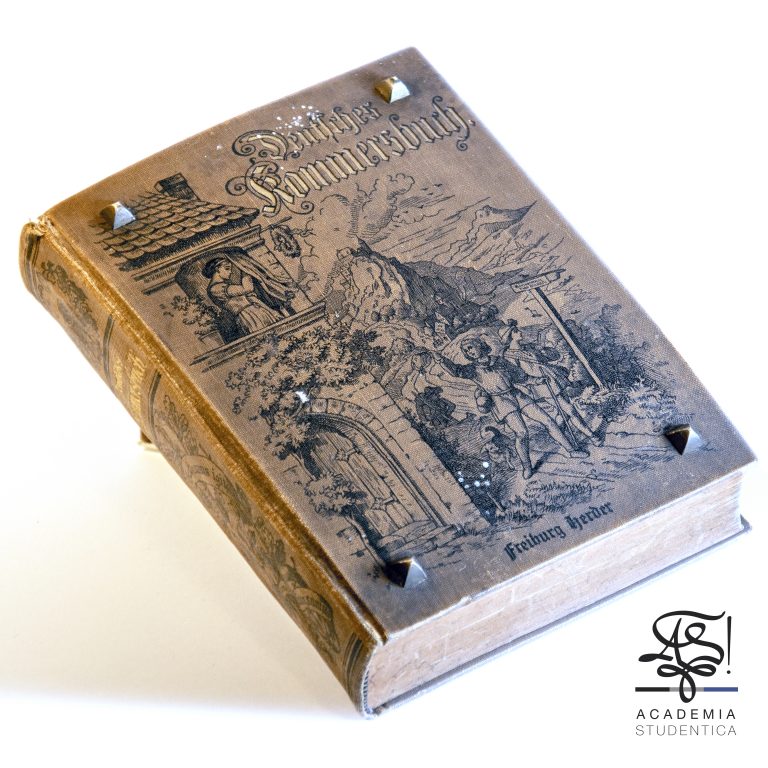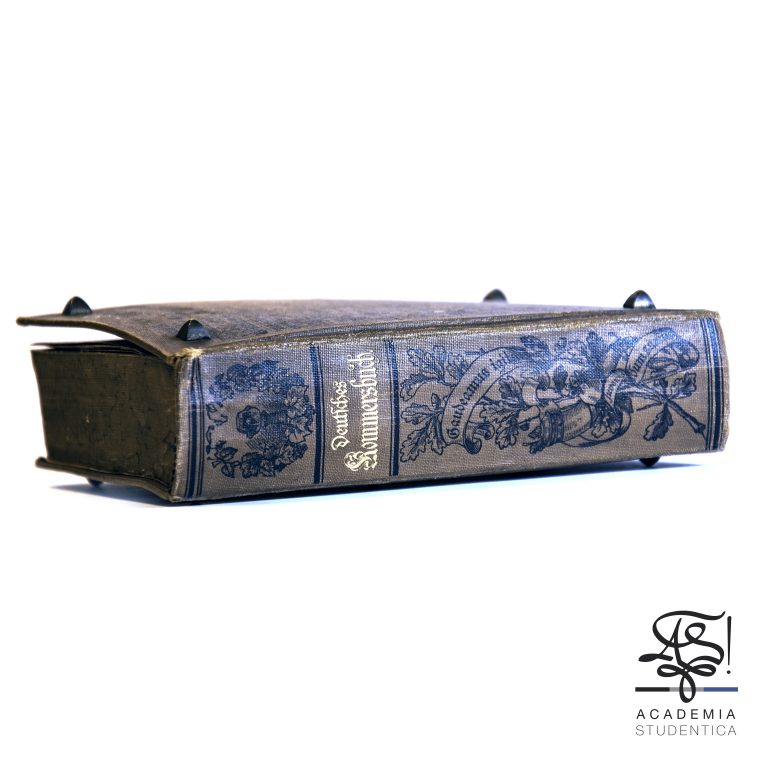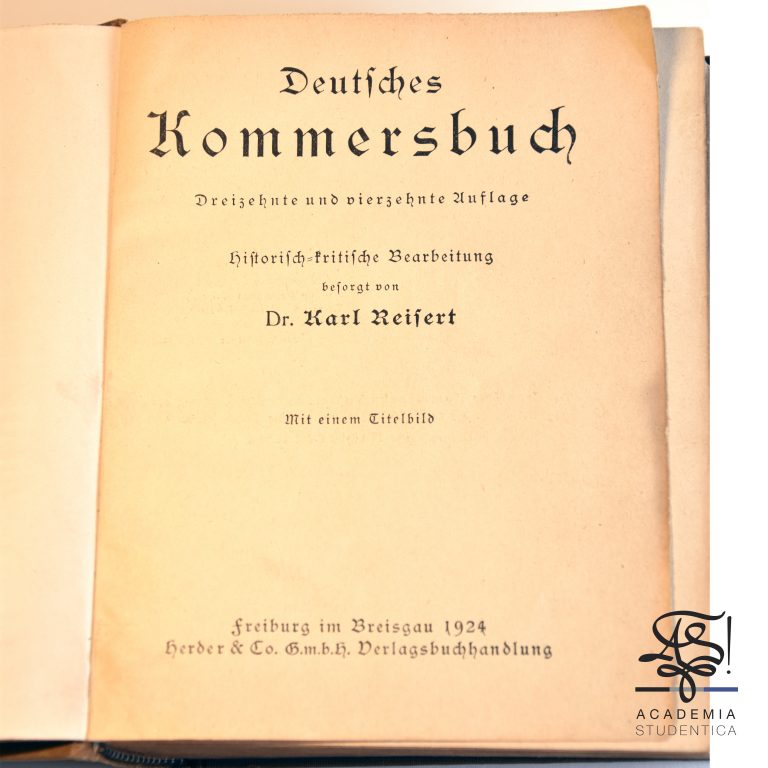Dr. Reisert, Karl, Deutsches Kommersbuch, Herder & Co., Germany, Freiburg im Breisgau, 1924.
Coll.: Pumba.
In 1876 the “Kartellverband der katholischen deutschen Studentenvereine” (KV) issued the “Deutsches Kommersbuch” with their own song collection, in order to not be dependent on the student songbooks of that time, which were not free from ridicule of religion, or a lyrical and frivolous way of life.
The first suggestion for this was given in 1864. For several years, a commission specifically set up for this purpose worked on collecting and arranging songs from the existing collections of boys ‘, hikers’ and humorous songs which were deemed suitable for Catholic students.
“Defects” that were cut out of the songbook in comparison to other common songbooks, were noticed by connoisseurs of a more genuine, louder and joyful poetry and were heavily criticized. Therefore a generous and well-planned historical-critical adaptation of the entire “Deutsches Kommersbuch” was undertaken. An adaptation which Dr. Karl Reisert from Würzburg took with the 7th edition and carried out in an exemplary manner that was fully acknowledged by the critics.
On the method and aims of his critical and new-creative activity, both in terms of texts and melodies, Reisert published a considerable number of essays in the “Akademische Monatsblätter”, which not only showed the author to be a conscientious expert, but also meant the best introduction and recommendation of the “Deutsches Kommersbuch” itself.
The songbook quickly came into common use in many other circles as well, and was appreciated and loved by young and old alike as a fresh and refreshing source of song because of its rich and excellent selection. In 1924 the last, 13th and 14th, edition of the Kommersbuch was published; it contains about 800 songs, among them about 660 with their own melody, of which 115 were composed for the book and 123 are printed with the permission of the composers or publishers.
Dr. Reisert, Karl, Deutsches Kommersbuch, Herder & Co., Allemagne, Freiburg im Breisgau, 1924.
Coll.: Pumba.
En 1876, le “Kartellverband der katholischen deutschen Studentenvereine” (KV) a publié le “Deutsches Kommersbuch” avec son propre recueil de chansons, afin de ne pas dépendre des recueils de chansons d’étudiants de l’époque, qui n’étaient pas exempts de ridicule de la religion, ou d’un mode de vie lyrique et frivole.
La première suggestion en ce sens a été faite en 1864. Pendant plusieurs années, une commission spécialement créée à cet effet a travaillé à la collecte et à l’arrangement de chansons provenant des collections existantes de chansons de garçons, de randonneurs et de chansons humoristiques qui étaient jugées appropriées pour les étudiants catholiques.
Les “défauts” qui ont été découpés du recueil de chansons par rapport à d’autres recueils courants ont été remarqués par les connaisseurs d’une poésie plus authentique, plus forte et plus joyeuse et ont été fortement critiqués. C’est pourquoi une adaptation historico-critique généreuse et bien planifiée de l’ensemble du “Deutsches Kommersbuch” a été entreprise. Karl Reisert de Würzburg a réalisé cette adaptation lors de la 7e édition, d’une manière exemplaire et pleinement reconnue par la critique.
En ce qui concerne la méthode et les objectifs de son activité critique et créative, tant au niveau des textes que des mélodies, Reisert a publié un nombre considérable d’essais dans l'”Akademische Monatsblätter”, ce qui a non seulement montré que l’auteur était un expert consciencieux, mais a également constitué la meilleure introduction et recommandation du “Deutsches Kommersbuch” lui-même.
Le recueil de chants est rapidement devenu d’usage courant dans de nombreux autres milieux également, et a été apprécié et aimé par les jeunes et les moins jeunes en tant que source de chants rafraîchissants en raison de sa riche et excellente sélection. En 1924, la dernière édition du Kommersbuch, la 13e et la 14e, a été publiée ; elle contient environ 800 chansons, dont 660 environ avec leur propre mélodie, dont 115 ont été composées pour le livre et 123 sont imprimées avec l’autorisation des compositeurs ou des éditeurs.
Dr. Reisert, Karl, Deutsches Kommersbuch, Herder & Co., Duitsland, Freiburg im Breisgau, 1924.
Coll.: Pumba.
In 1876 gaf de “Kartellverband der katholischen deutschen Studentenvereine” (KV) de “Deutsches Kommersbuch” met een eigen selectie liederen uit, om niet afhankelijk te zijn van de studentenzangboeken van die tijd, die niet vrij waren van spot met religie, of van een lyrische en frivole levenswijze.
De eerste suggestie hiervoor werd gegeven in 1864. Een speciaal voor dit doel opgerichte commissie werkte enkele jaren aan het verzamelen en arrangeren van liederen uit de bestaande verzamelingen van jongens -, wandelaars- en humoristische liederen die geschikt werden geacht voor katholieke studenten.
“Defecten” die in vergelijking met andere gangbare liedboeken uit het liedboek waren geknipt, werden door kenners van een meer oprechte, luidruchtige en vrolijke poëzie opgemerkt en zwaar bekritiseerd. Daarom werd een uitgebreide en goed geplande historisch-kritische bewerking van het hele “Deutsches Kommersbuch” ondernomen. Een bewerking die Dr. Karl Reisert uit Würzburg met de 7e editie op zich nam en op een voorbeeldige manier uitvoerde die door de critici volledig werd erkend.
Over de methode en de doelstellingen van zijn kritische en nieuwcreatieve activiteit, zowel wat betreft teksten als melodieën, publiceerde Reisert een aanzienlijk aantal essays in de “Akademische Monatsblätter”, die de auteur niet alleen een gewetensvolle expert toonde, maar ook de beste inleiding en aanbeveling van de “Deutsches Kommersbuch” zelf betekende.
Het liedboek werd al snel overgenomen in veel andere kringen en werd door jong en oud gewaardeerd en geliefd als een nieuwe en verfrissende bron van liederen vanwege de rijke en uitstekende selectie. In 1924 verscheen de laatste, dertiende en veertiende editie van het Kommersbuch; het bevat ongeveer 800 liederen, waaronder ongeveer 660 met een eigen melodie, waarvan er 115 voor het boek zijn gecomponeerd en 123 met toestemming van de componisten of uitgevers zijn gedrukt.


